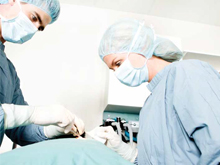Health Topics
-
Healthy Living
-
|
|
February 2011
|
| Dil Se |
| A Chronicle of Coronary Bypass Surgery in India |
| Dr. M.R.Girinath |
| |
 |
It was technicolour India of the early 80s: the Maruti car was just two years old, the colour TV (with long exterior antennas) had just come in following the Asian Games, and the VCR was the domain of the rich (the janta dared aspire only for the VCP, at best). Less than 500 coronary bypass procedures had been done in our country till then – the rich opted to fly to the USA and the UK for surgery. |
Surgeries in our government-run institutions and a few private hospitals emphasised on diseased heart valves and congenital heart conditions.
That was when the Apollo Hospitals, Chennai, chose the Vijayadasami day in 1983, to perform its first open heart operation. This soon set off a chain reaction in the country - resulting in 15-20 per cent more cardiac surgeries being done every year following that!
Power of a Dream
Ushering in a culture of new cardiac surgery was certainly not easy. Inspired by the Chairman Dr Prathap C Reddy’s vision and pioneering spirit, the Apollo Hospitals had its task cut out. The first challenge was to assemble competent professionals to provide results comparable with those being reported from western countries.
“Hum kisise Kum nahin†(we are lesser to none) was the slogan then – and
patient-friendly services, caring attitude and affordable packages also were viewed as essentials. The response meanwhile, was overwhelming.
Patients started streaming into the Apollo Hospitals, Chennai, from all corners of India - and also from neighbouring countries. In less than two years of the hospital’s inauguration, more than 1000 bypass surgeries were done! The rest of the country could not help but sit up and notice. This encouraged hospitals all over India to invest in cardiology and cardiac surgery, despite the heavy expenditure involved - and led to a rapid increase of cardiac-related services in our nation.
Number Speak
- In the two decades that followed, nearly 30,000 heart operations have been performed at the Chennai Apollo Hospitals.
- Of these, nearly 22,000 have been coronary bypass operations.
- Until about seven years ago, these operations were being done by conventional techniques involving the use of the heart-lung machine.
- At present, nearly 90 per cent of coronary bypass operations are done using the beating heart technique.This brought about a very significant reduction in post-operative complications and a reduction in hospital mortality to around 0.6 per cent.
- Due to Apollo Hospitals’ pioneering efforts, the national statistics for heart surgery has seen a quantum rise.Prior to 1980, coronary bypass surgery formed less than five per cent of the cardiac surgeon’s workload. At present,it is over 70 per cent.
More is Still Less
The cardiologists at Apollo also pioneered Balloon Angioplasty procedure, positioning themselves at the forefront of percutaneous interventions. The Apollo Hospitals also trained scores of surgeons and an equal number of cardiologists, many of who have now moved on to various places, spreading the expertise gained.
With a reported incidence of around 12 per cent in the urban adult population in India and an estimated 60 million individuals suffering from coronary artery disease, the 72000 procedures that we are currently doing are woefully inadequate.
What we need now is, to acknowledge the unfortunate truth that being an Indian also puts us at risk for developing coronary artery disease. The way ahead is, to realise that the only remedy is to greatly reduce that risk with a sensible lifestyle, modified dietary habits, regular exercise and periodic medical check-ups.
|
10 Tips for Caregivers
As a caregiver, you may think your first responsibility is to your loved one, but it is really to yourself. Did you know that caregivers may have increased blood pressure and insulin levels, impaired immune systems and an increased risk for cardiovascular disease among other adverse health outcomes? Research also shows that many caregivers are clinically depressed and often suffer from sleep deprivation and poor eating habits
- Choose to take charge of your life and don’t let your loved one’s illness or disability always takes centre-stage.
- Remember to be good to yourself. Love, honour and value yourself. You’re doing a very hard job and you deserve some quality time just for yourself.
- Watch for signs of depression and don’t delay in getting professional help when you need it.
- When people offer to help, accept their offer and suggest specific things to them to do.
- Educate yourself about your loved one’s condition.Information is empowering.
- There’s difference between caring and doing. Be open to new technologies and ideas that promote your loved one’s independence and help you make your job easier.
- Trust your instincts. Most of the time they’ll lead you in the right direction.
- Grieve for your losses, and then allow yourself to dream new dreams.
- Stand up for your rights as a caregiver and as a citizen.
- Seek support from other caregivers. There is great strength in knowing that you are not alone
|
|
 |
Dr. M.R.Girinath is
Sr. Interventional Cardiologist at Apollo Hospitals, Chennai. |
|
|